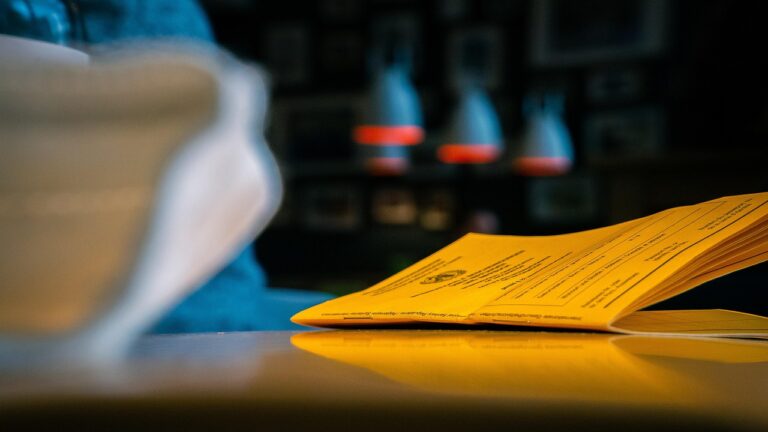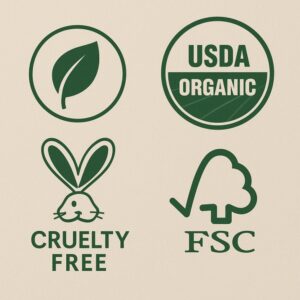
What Are Certifications and Eco-Labels?
Certifications and eco-labels are official symbols that show a product meets specific environmental or ethical standards. These are issued by independent, trusted organizations after evaluating how the product is made, where it comes from, and how it affects people and the environment.
Commonly seen on product packaging or brand websites as a leaf symbol, organic logo, or cruelty-free bunny, these labels help consumers quickly identify products that match their values.
Why They Matter in Today’s Market

Nowadays, where people increasingly want to make better choices, the abundance of products claiming to be natural or eco-friendly creates confusion. This is where third-party certifications become crucial. They act as proof that a brand is genuinely committed to sustainability.
Like trust badges, certifications help consumers believe a brand is credible and honest. They give buyers confidence in their purchase, reduce the risk of greenwashing, and support long-term relationships between brands and their customers based on transparency and integrity. These labels also enhance a brand’s competitive edge in the green marketplace.
When shoppers encounter a product with a green leaf symbol or terms like “USDA Organic” or “PETA Cruelty Free,” it instantly feels more trustworthy and planet-friendly. These labels simplify decision-making, allowing buyers to make quick, guilt-free purchases.
For eco-conscious consumers, especially the younger generation, certifications go beyond product quality. They mirror personal values and a desire to support responsible and transparent brands.
In simple words, certifications are like report cards for brands. They are granted by reputable organizations that check whether a product or company meets specific environmental or ethical standards. Once approved, the brand earns the right to display the certification logo on its packaging, signaling authenticity.
Common Global and Indian Certifications

With so many products making eco-friendly claims, certifications help separate genuinely sustainable options from those that are not.
Globally, certifications like USDA Organic confirm food is grown without harmful chemicals, ECOCERT assures skincare products use clean, organic ingredients, FSC certifies that wood or paper comes from responsibly managed forests, and the PETA Cruelty-Free logo guarantees no animal testing.
In India, certificates such as India Organic, issued by the government, verify that farming and processing follow organic practices. The GreenPro label, developed by CII, is used for products that are environmentally safe and resource efficient. The Jaivik Bharat logo helps consumers easily identify truly organic food items.
These national certifications bring clarity and confidence to Indian consumers looking to support sustainable products.
Example: Earth Rhythm – Personal Care with an Eco-Conscious Indian Identity

A good example is Earth Rhythm, a leading eco-conscious Indian personal care brand. Known for blending science-backed formulations with a strong commitment to sustainability, the brand offers skincare, haircare, and makeup products that are cruelty-free, clinically tested, and packaged in recyclable materials.
Earth Rhythm uses ECOCERT-certified ingredients, ensuring its products meet strict international standards for being natural and organic. This reassures consumers who are skeptical of greenwashing and seek proof of purity.
The brand also carries the PETA Cruelty-Free certification, confirming that no animal testing is involved. This transparency makes eco-conscious customers feel confident, knowing they are supporting a brand that genuinely cares about health, ethics, and the planet.
Frequently Asked Questions (FAQs)
1. What are eco-labels and how do they help buyers?
These labels give consumers visual confirmation that a product meets certain standards. They’re useful when choosing between similar items, especially in stores or online. By spotting a symbol they recognize, people can feel more confident about what they’re purchasing without researching every ingredient or process.
2. What does certification mean on a product label?
It means the product has passed third-party testing to meet certain rules, often related to health, safety, or sourcing. The review body ensures these standards are followed. For buyers, it offers peace of mind and makes product selection easier and more transparent.
3. Do eco-labels simplify everyday shopping decisions?
Yes. With so many choices available, it’s often hard to know which items are responsibly made. These small symbols act like shortcuts, letting people quickly recognize options that align with their values—whether environmental, ethical, or both—without having to study long product descriptions.
4. How is certification different from a brand’s claim?
A self-made claim is not always verified, while certification involves outside evaluation. This added step reduces exaggeration and builds trust. For shoppers, knowing that someone independent has reviewed the product can make the difference between clicking “buy” or moving on.
5. Are eco-labels limited to specific industries?
No. While common in food and skincare, they’re also found on home goods, textiles, and cleaning products. Some even appear in tourism or energy services. Their growing use shows that responsible production is valued in many industries today.
6. Can certification reduce the chance of being misled?
Yes. It helps protect consumers from misleading promises about a product’s origin or impact. Since an external organization checks compliance, buyers don’t need to rely solely on brand messaging or advertising to feel confident about what they are getting.
7. Why do companies highlight eco-labels in packaging?
A clear, verified label stands out on the shelf. It sends a strong message that the company cares about more than just profit. For many shoppers, this small detail creates a strong first impression and often builds immediate trust.
8. Are these programs the same around the world?
Not exactly. Some labels are recognized globally, while others are regional or national. Criteria can vary, but the goal is the same—to let consumers know a product follows certain responsible guidelines they can trust, regardless of where it was made.
9. Do these symbols influence what people buy?
They absolutely do. Even if it’s subconscious, seeing an approved seal can encourage someone to make a purchase. It shows accountability, which appeals to buyers trying to choose responsibly without spending hours researching each product online.
10. Can certifications improve a company’s reputation?
Yes, especially when shoppers value honesty. Approval from an external group shows a willingness to meet high standards. This is not just about checking a box—it can affect how customers see the entire brand and what it stands for.
11. What are some widely known eco-labels?
Some familiar ones include organic farming logos, forest stewardship marks, and cruelty-free icons. These certifications come from groups that have strict evaluation processes. When you see one, it usually means the product passed multiple layers of review.
12. What role do they play in transparency?
They provide visible, verifiable proof. Instead of taking a brand’s word for it, shoppers can rely on these marks to confirm key details. It helps bridge the gap between product claims and real-world impact, especially for complex items.
13. What does USDA Organic mean?
It guarantees the product was made without synthetic pesticides or GMOs. This label is common on food items and helps people make safer, more informed decisions. It is trusted by those who value natural sourcing and clean farming methods.
14. What kind of items does ECOCERT approve?
ECOCERT mainly focuses on personal care, home cleaning, and food items. Its review covers ingredients, manufacturing, and packaging. When this label appears, it suggests attention was paid to how the item was made and what is inside it.
15. Why do wood or paper items show the FSC label?
The FSC symbol indicates the item came from responsibly managed forests. It is popular on notebooks, packaging, and furniture. For buyers, it’s an easy way to support forest conservation without having to check sourcing manually.
16. What is India Organic used for?
This national seal confirms that crops were grown using organic methods. Farmers and companies must follow strict guidelines to earn it. Seeing this logo tells Indian consumers the food they are buying meets the country’s approved organic standards.
17. What does GreenPro certification stand for?
It marks items that are resource-efficient and environmentally safe. Found mostly on appliances and construction products, this label is designed to support sustainable design and responsible material use. It promotes eco-smart choices for homes and buildings.
18. Why is Jaivik Bharat important in Indian food markets?
It helps shoppers quickly spot genuine organic products. Backed by the Indian government, this simple symbol avoids confusion and makes choices faster. It gives confidence to people who care about avoiding chemicals or genetically modified ingredients.
19. How can lesser-known brands gain trust?
Displaying approved symbols builds credibility. Even if people haven’t heard of the company, a verified label gives assurance. It shows that standards were followed, which can make smaller or new brands more appealing and trustworthy.
20. Is outside certification required by law?
Not always. Some industries are regulated, but most participation is voluntary. Still, brands often choose to go through the process to strengthen their public image and support a more honest, responsible approach to business.
21. What does a cruelty-free logo mean?
It means the product was not tested on animals at any stage. This matters especially in skincare or makeup, where animal testing has long been an issue. For people concerned with animal welfare, it’s a key sign of responsibility.
22. Are eco-labels only for environmental issues?
No. Some also cover ethics, labor rights, or fair trade. The scope depends on the group granting the approval. These labels can represent a broader commitment to doing business in a way that respects both people and the planet.
23. Can trust in a product increase loyalty?
Yes. When people feel confident in what they buy, they return. Verified symbols help reassure buyers that they’re supporting responsible practices. Over time, this connection builds long-term loyalty to the brand or company.
24. How can someone verify if a label is real?
They can visit the certifying body’s website or look for the product in its public database. This extra step ensures that the symbol is official and that the product has truly met the listed criteria, not just marketing promises.
25. How does Earth Rhythm use certification effectively?
This Indian brand includes third-party approvals on its packaging and website. By doing so, it shows that its claims are backed by real testing. For shoppers seeking cleaner options, this approach builds confidence and supports ethical business growth.
Penned by Ankita Behera
Edited by Sneha Seth, Research Analyst
For any feedback mail us at [email protected]
Transform Your Brand's Engagement with India's Youth
Drive massive brand engagement with 10 million+ college students across 3,000+ premier institutions, both online and offline. EvePaper is India’s leading youth marketing consultancy, connecting brands with the next generation of consumers through innovative, engagement-driven campaigns. Know More.
Mail us at [email protected]